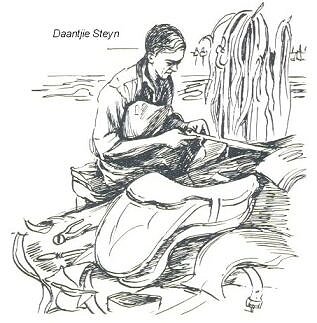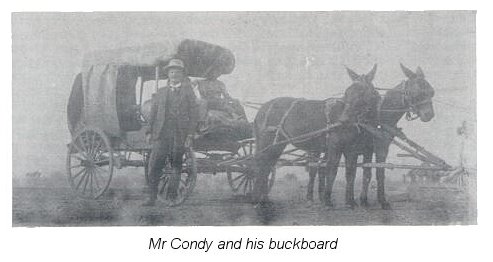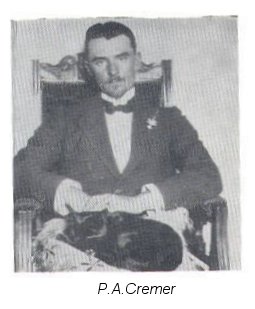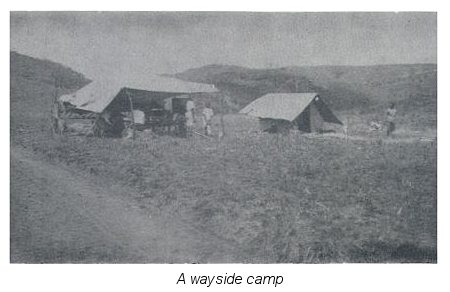At Nachtmaal
the village buzzed with
excitement for a few days. Farmers and their families came from far and wide,
bringing everything to make themselves comfortable: bedsteads, chairs, tables,
and even chests of drawers and sideboards. They drew up their wagons and pitched
their tents on vacant stands.
Religious services were held, and various committees met and the Young
People�s Debating Society held their meetings. In the evenings groups of people,
young and old, gathered round the campfires, singing to the concertina and
mouthorgan, telling stories, and generally enjoying themselves. Mrs. Elliott and
Madge called on each family, and were always received with great kindness and
genuine hospitality; they had everyone back to tea in their home, and made many
good friends in spite of the fact that a lot of the older people did not know a
word of English and the Elliotts knew no Afrikaans.
The highlight of the December Nachtmaal was a bazaar to raise funds for
the Church, and the townspeople were glad of the opportunity to stock up with
high quality supplies of bottled fruit, jams and konfyt, chutney and jellies,
delicious homemade bread and cakes, fruit, vegetables and needlework. The meat
stall always did a roaring trade:
boerewors, mutton, live sheep, ducks,
turkeys and beef were in great demand, and what could not be used immediately
was put into the brine tub.
The Elliotts had all visiting Government officials to stay with them
and also the Chipinga and Mount Silinda people on their way through. Even
Commandant Luon from Espungabera had to come through Melsetter to get to
Beira.
Scotchcarts with their high wheels, drawn by four spirited horses,
were useful over uneven terrain. The front seat across the cart normally sat
two, and behind the shared backrest there was another seat with the passengers facing
backwards � terribly sickmaking for those not accustomed to
it.
The children all had to help with household chores as soon as they were
old enough to be allotted tasks, but when those were done their life was
delightful and carefree, with few rules and regulations. The boys enjoyed
shooting with catapults or, if lucky enough, with a pellet gun, and there was
regular riding in the open countryside on donkeys, and occasionally there was
the delight of having a horse to ride. The young Koks visited their grandparents
at Belmont, two or more of them mounted on their horse Silver.
 Memories include visits to Daantjie Steyn, the village cobbler, saddler
and dentist. A donkey ride to the dentist was unpleasant, with a cold head-on
wind agrravating the aching tooth; once the powerful Steyn had his young patient
in his grip there was no escape until the offending tooth was extracted, and
there were anxious moments while the patient watched carefully to see that the
correct implement was selected from the mixture of cobbling, leatherwork and
dental tools on the work-bench. Daantjie made good boots which lasted well but
imparted to the wearer�s feet an unmistakable smell from his home-tanned
leather: the children went barefoot during the week, but on Sundays their clothes included stockings and boots, which were
torture as they always seemed too
small.
Oom Gallie took Sunday School in High Dutch, and few of the children
found his services easy to understand. Those from outside rode in on donkeys and
changed into their tidy Sunday clothes in the gwasha near the Police Camp before
the service.
Camping trips were a joy. On one occasion John Martin took his family
and a party of others with four wagons down to the Sabi to trade. Two wagons had
half-tents in which the women slept while the men slept under the wagons. The
day started about 3 a.m. when the oxen were inspanned while the travellers had
hot coffee and rusks. The wagons jolted and squeaked over the rough tracks, and
memories recall the camp fires, the darkness with the wagons drawn up one behind
the other, the silhouettes of the oxen lying down tethered to the trek chains,
and the African drivers and voorleiers (piccanins who walked in front and led
the oxen) round their own fires.

During the 1914-1918 War Melsetter had an active War Fund Committee,
and impressive donations were made to a vast number of relief funds in Britain,
Rhodesia and other Allied countries. The Fund closed in August 1919 with the sum
of �573.4.2d in cash or value � items such as donations of 12 oxen are listed �
and it was decided to erect a small hail as a Memorial to those who fell in the
War.
When Spanish Influenza hit the area there was no doctor at Mount
Silinda so Dr. Rose�s territory was larger than usual: the epidemic struck in
many parts at the same time and of course all his practice was on horseback.
From the terse, mainly telegraphic, records, it is obvious that from June to
September 1919 he lived at absolutely full stretch.
In June a police telegram sent via Police, Umtali, reported 12 native
deaths. All public meetings were prohibited and church services postponed. By
23rd there had been further deaths at Silinda and 500 natives were sick in the
Chipinga area. Dr. Rose had attended 40 cases in the Rusitu area and arranged
for Howells at the Mission, assisted by two messengers, to attend to local
cases, and all natives at the Mission and many in the thickly populated Rusitu
valley had been inoculated. In Melsetter he had dealt with eight native and four
European cases. By the 27th one native had died at Melsetter and two more at
Silinda; 45 Europeans and 60 natives were ill at Melsetter and the position was
senous in Ngorima Reserve.
In July the schools were closed and had not re-opened by November. The
Government sent Dr. Gurney to help Dr. Rose at Chipinga, where in August there
were 27 European cases. One native died at Rocklands, 18 in Ngorima Reserve, and
five at Uitkyk. A cordon was established from 1st to 16th July, the natives on
the cordon being paid 8d a day.
Telegrams regarding the position flew backwards and forwards, and
needles, syringes and thousands of doses of vaccine were asked for. It was
difficult to get enough supplies, and the position was further complicated by a
Railway strike which prevented vaccine being despatched promptly. On-the-spot
reports were sent in by the N.C. as well as by the District Surgeon. By
September the outbreak had died down, and surplus vaccine was returned to
Salisbury.
That year cattle farmers had practically recovered from the heavy
losses from A.C.F., trade in livestock was carried on at good all-round prices
and hopes were high that A.C.F. was being eradicated.
H. Franklin was posted as Clerk in the Native Department, and Mrs.
Franklin with her two children travelled on the coach with Longden and Charlie
Remmer. The Franklins lived in a cottage consisting of two small rooms and an
outside kitchen next door to Ferguson. Weekly events were the arrival of the
Booze and Butter postcart and Leggy Martin�s auction of butter, eggs,
vegetables, poultry and other produce sent in by farmers. Dave Morris�s horses,
which were stabled in a grass shelter, were burned to death when early one
morning in winter the stableboy went to feed them carrying a lighted candle, and
the whole thing went up in flames. Dr. Rose was in Umlali on official business
when Mrs. Franklin�s baby was due, so when she felt it was time she walked over
to Mrs. Leggy Martin at Rose Cottage, about a mile away, where the baby was
born.
 The most successful farm school was on F. W. S. Smith�s Springvale, and
with its establishment P. A. Cremer began his long association with Melsetter.
Later he married Lalie Steyn and took over and developed Johannesrust farm
school, today�s Cashel School. He and Mrs. Cremer live on Msapa today, with Mrs.
H. L. Steyn on Constantia a close neighbour.
Early in 1919 Condy rode out to Springvale with Stanley and discussed
with interested parents the opening of a school; arrangements were completed and
parents who shared in the erection were exempted from School Fees for one
year.
They built the schoolroom, 36� x 18�, with walls 10� high and a
thatched roof. They made the two windows and the door themselves as they found
the Government grant of �5 insufficient to buy sash windows at �7.10 each in
Umtali. Schalk Kloppers made the desks from local timber with a grant of up to
�15, and the furmture remained Government property.
Smith undertook to board the teacher at not more than �12 a quarter,
and a teacher�s room was built adjoining the schoolroom. It was unfinished when
the school opened, and when Cremer arrived he had to bear the cost of �5.15 for
materials for a ceiling which he put in himself, he bought four windowpanes at
4/3d each, and put in a floor of locally sawn planks. Later Condy said that the
schoolroom was neat and clean, and asked for an allowance for Cremer of 5/- a
month towards the cost of the boy employed by him at 10/- a month plus food, to
clean the school and look after his horse.
The school opened in September 1919 with 13 day-scholars and five
boarders: the building was not completed and the delay caused considerable
inconvenience, but with Cremer�s assistance it was gradually finished off. In
running the school from Sub Std. A through to Std VI, he steadily overcame the
difficulties of teaching children whose home language was Afrikaans and who had
had little or no previous education although many were in their teens. The
standard of attainment in English was much higher than Condy was accustomed to
find in schools of that type, and gradually the average age in each class became
satisfactory. An example of progress was a girl, aged 13 when she started in Sub
Std. A in July one year, who passed Std. V at the end of the following
year.
Numbers fluctuated in an unsatisfactory manner: in the first two years
31 came and went, with 18 the peak attendance and ten the lo\vest. The case of
Thomas Bosch was an example of how children were removed: he started school in
Sub Std. B, and two years later was in Std. V, able to take a creditable place
in Std. VI anywhere in Rhodesia, but was taken away from school to herd cattle
for the Tarka Ranch Manager in order to earn some money. At Condy�s request he
was sent back to school and was recommended for a free place at Melsetter
School.

John Kloppers was born in 1912 and went to Spnngvale School when he was
seven. It seems that he was not a model scholar, as his chief memory is of
having his backside lambasted with a quince stick, but he does appreciate the
fact that an effort was made to drill something into him. His memories include
much walking and the occasional donkey or horse rides in getting to school later
in Melsetter and in visiting his grandparents in Chipinga. When he went to
Umtali High they travelled in a lorry, and nobody minded if it got bogged down
on the way to school but it was a different matter when they were anxious to get
home as quickly as possible.
In 1919 Joey Grobler came to Melsetter to get married. George Gifford
met her at Weltevrede, and they rode over Sawerombi to The Residency, where she
spent the night with the Elliotts.
The Rhodesia Advertiser carried a full account of the very pretty
wedding, at which Elliott officiated in the specially decorated Courthouse. The
bride, who had endeared herself to children and grownups alike, was attired in a
pretty cream poplin costume with a white georgette hat, and carried a bouquet of
white roses. After the ceremony a reception was held in the Courthouse; the
presents were many, costly and useful, and included some substantial cheques. In
the evening a very enjoyable dance was given by Lethbridge and Gifford, with
attractive cosy corners tastefully arranged.
Some years before George Heyns had promised to lend his cart and horses
for this wedding. He had since died, but his widow remembered the promise, and
her son-in-law Solomon Potgieter had the cart ready after the reception. Joey
changed and Fred drove the cart while Potgieter followed on Fred�s horse until
Thornton, from where he drove back. Mrs. Delaney mounted a Zanzibar donkey
equipped with the bridegroom�s present of a saddle, and they set off along the
footpath to Willow Grove.
Fred managed Willow Grove and Fairview for John Meikle, who on occasion
came by coach to Melsetter, a horse was sent in for him, and the two men were
out on horseback every day checking the cattle as they wandered far and wide
right down to Cecilton as there were no fences. Leopards were troublesome and
Fred killed 59 during his seven years there.
Once he rode to Odzi with drovers to take delivery of some cows and
calves, while Mrs. Delaney stayed in Melsetter with the Mullings and the
Remmers. The trip took three weeks, longer than expected because the newborn
calves were too weak to walk long distances; there were delays waiting for
streams to go down; and Fred�s horse died of horsesickness, and he had to walk
with a boy carrying his saddle.
They stayed with the Oxden Willows on Gwendingwe, and Condy visited
them to see how a teacher had taken to farm life. Another visitor was George
Gordon, the D.V.S., who planned to leave early in the morning so goodbyes were
said overnight; in the morning the Delaneys heard him up early, walking up and
down the stoep, and Fred got
up to see if he wanted to speak to him again,
and found their seven dogs below the steps just waiting to tackle Gordon when he
stepped down.
They went to the village for weekends, where they played tennis and
danced in the Courthouse, where Mrs. Longden taught them the two-step and the
foxtrot. When Basil was born Mrs. Delaney made a tent with quince canes and a
nappie for the round basket in which the baby lay on a cushion, and a boy
carried it on his head and a girl followed with the portmanteaux. When Meikle
gave up his Melsetter farms in 1926 the Delaneys moved to their own farm Olive
Cliff.
~~~000~~~
|